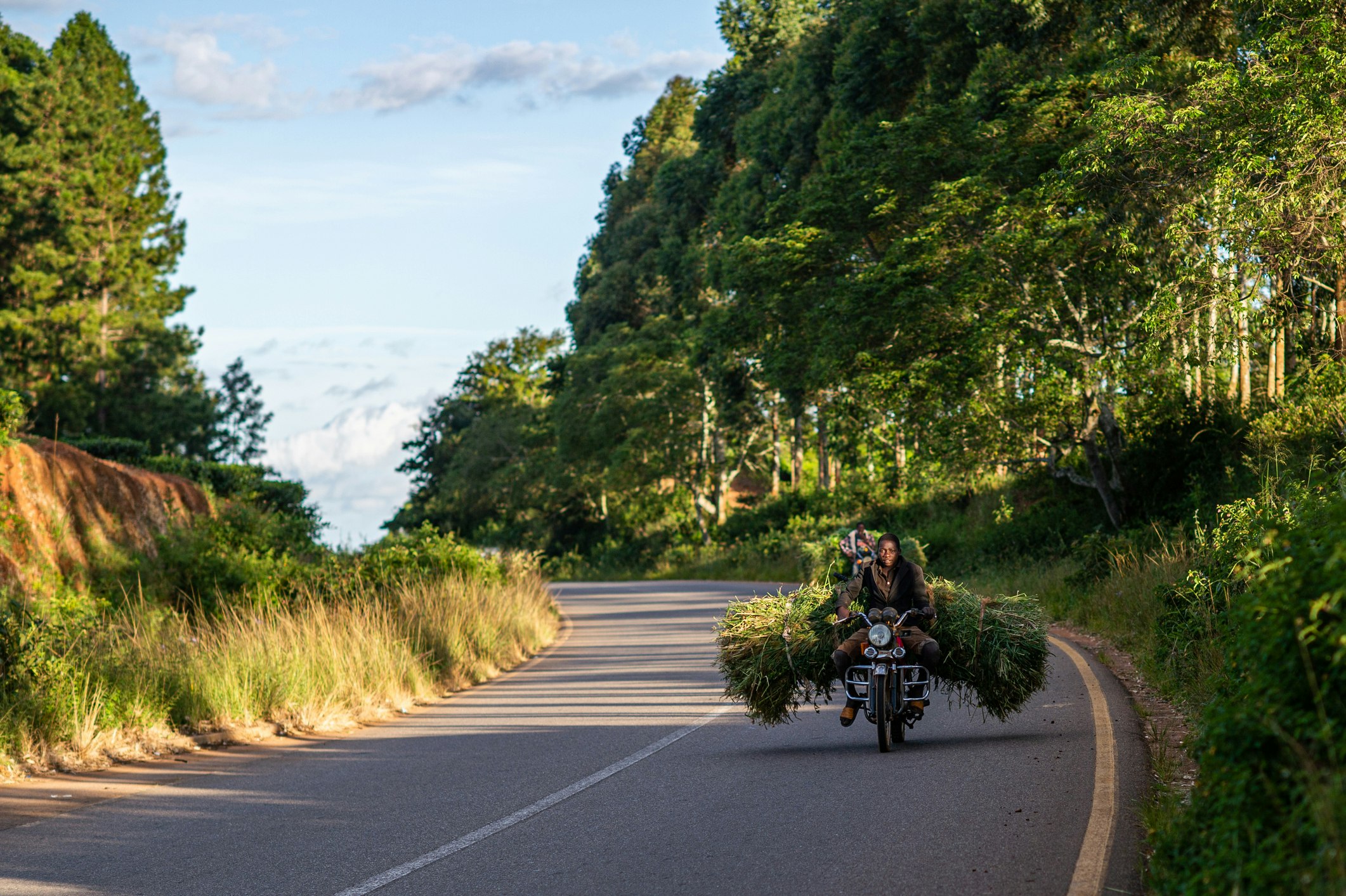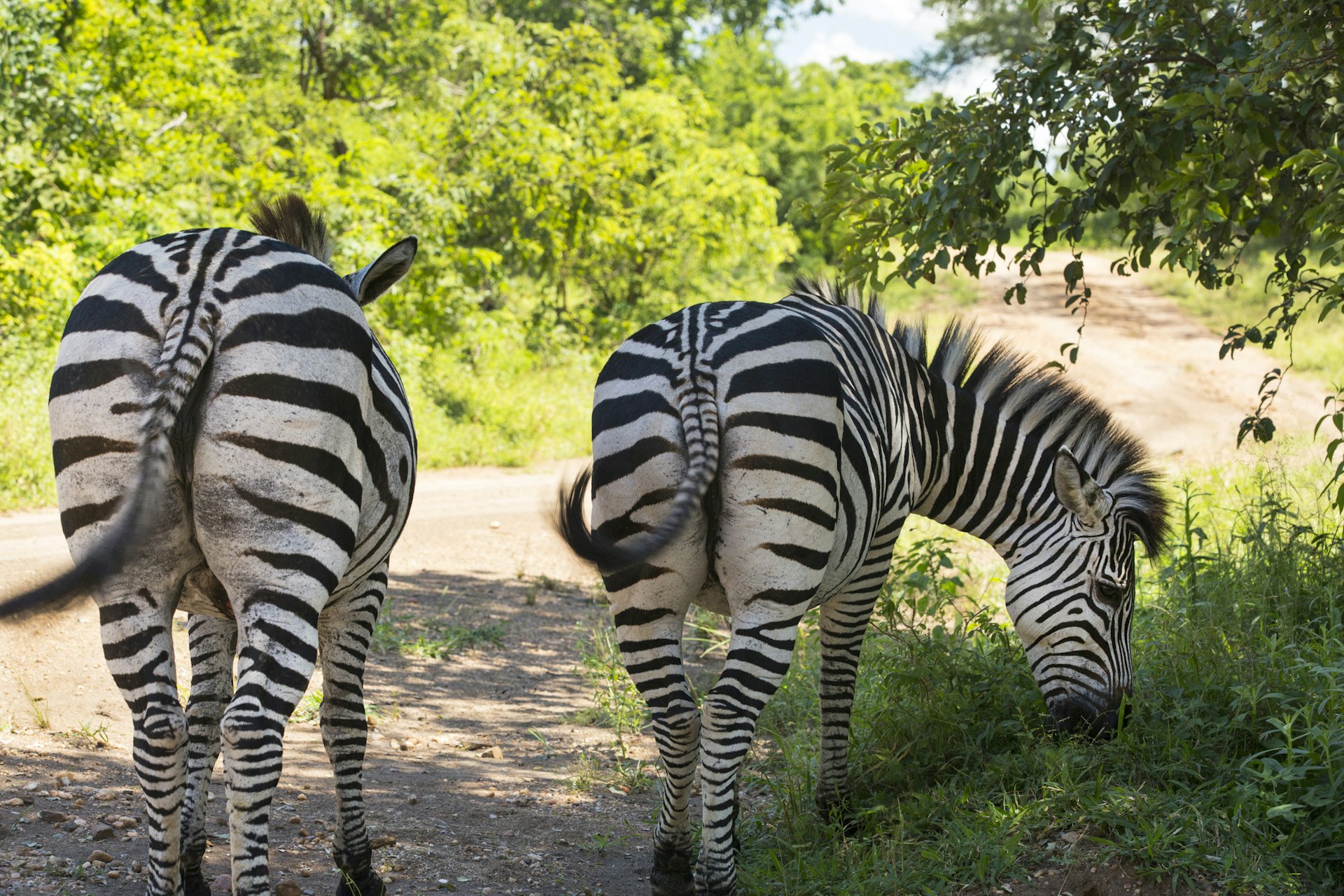The geographical diversity of Malawi is likely to capture your attention as you travel around.
And with a fairly dependable coach system that covers all the major routes, you could see a lot of the country using public transportation. However, to get to some off-the-beaten-track locations in this beautiful place, and to explore the wildlife and national parks at leisure, you’ll want to organize your own road trip.
From day outings to multi-day epic adventures, these are the best road trips in Malawi, from the wide Shire River in the south to the zigzag route to Livingstonia in the north.
1. Drive the Thyolo Escarpment to Majete Wildlife Reserve
Best road trip for wildlife
Blantyre–Majete; 70km (43.5 miles)
It’s hard to describe the grandeur of the views as you descend the high Thyolo Escarpment, heading ever downwards to the sweltering Shire River valley. This southernmost tip of the country is surrounded by Mozambique and cut through by the wide and looping Shire, whose waters shelter hippos and crocodiles. In the distance, you’ll see the hills of the Majete Wildlife Reserve, your destination on this drive.
It’s worth staying at least a couple of days in Majete, either camping or in one of the lodges. A car affords you the luxury of nature drives: the revived park features all the Big Five animals, as well as birds and other wildlife in abundance.
Planning tip: Ask at your accommodations for detailed guidance on driving protocol. If you round a corner and chance upon a herd of elephants, especially if they have young, it’s best to reverse away as slowly and unobtrusively as possible.
2. Conquer the hairpin bends near Livingstonia
Best trip on an exciting road
Chitimba–Livingstonia; 15km (9.3 miles)
The near impossible zigzag of dirt road from the shores of Lake Malawi up the high escarpment to Livingstonia has been described as the most exciting road in Africa. More than 20 hairpin bends lead up through the thick Brachystegia woodland, with occasional dizzying views back to the lake. At the top, you’ll find a cluster of excellent escarpment-edge lodges, including Mushroom Farm and Lukwe Eco-Camp.
Detour: If you’re not ready to stop, press on for another 6km/3.7 miles (blessedly flat) to the historic settlement of Livingstonia, which has colonial buildings including a church and the Stone House constructed by early Scottish missionaries.

3. Explore Malawian art and culture around Dedza
Best road trip for art lovers
Lilongwe–Lilongwe; 320km (199 miles)
This scenic four-day itinerary leads from the capital Lilongwe to the pottery town of Dedza, where you can stay overnight at the renowned Dedza Pottery Lodge, have a go at pot-making yourself or buy some of the beautiful products. In the morning, head east to see the mesmerizing ancient rock art at remote Chingoni, with an overnight stay at Kazela Forestry Resthouse – or stay a second night at Dedza.
Continue your cultural travels by heading east to the KuNgoni Centre of Art and Culture, a hub of woodworking that also holds an impressive collection of Chewa masks. You can stay at Namalikhate Lodge at the center, which has a restaurant decorated with masks and wood carvings. Back at Dedza, take the M1 north to return to Lilongwe.
4. Take the twists and turns of the Zomba Plateau
Best road trip for foodies
Zomba–Zomba Forest Lodge; 10km (6.2 miles)
Fabled for its walks and its sweeping views, Zomba Plateau is a magnet for hikers who are looking for a wilderness feel that’s less of a challenge than Mt Mulanje.
The most attractive accommodation option is Zomba Forest Lodge, a remote off-grid resthouse that lies to the west of the main cluster of plateau buildings. The dirt track leading to the lodge from Zomba town twists and turns as you drive higher, enjoying ever more spectacular views down the plateau and across the plains below. Follow the Lodge’s detailed instructions to help you find your way there safely.
Once you’ve arrived, you can relax in this sociable yet secluded place with its troop of samango monkeys and devour the wonderful food. Everything is homemade, from breakfast muffins and muesli in the morning to salads and pastries served for lunch in the idyllic forest-wreathed garden to the berry-infused sundowner gin. Dinner might start with forest mushroom soup followed by coconut-stuffed chicken with fragrant rice, chutneys, seasonal salads and an indulgent dessert. All diets are catered for, and the abundance of local fruit and vegetables makes it a good option for vegetarians and vegans.
Planning tip: Be sure to book your stay in advance, and ask the owners about the impressive local efforts to reforest the plateau.

5. Head uphill to Ntchisi Forest Reserve
Best road trip for nature lovers
Lilongwe–Ntchisi; 116km (72 miles)
Within easy weekending distance of the capital Lilongwe, Ntchisi is a montane forest reserve with small scattered villages and wildlife, including duikers, porcupines, bushpigs, hyenas and leopards. It’s also a wonderful place for birders, with sunbirds, canaries and greenbuls darting through the liana-knotted trees. The drive here is a steep and challenging but deeply beautiful one, leading to a long low building, a 1914 colonial house that is now the Ntchisi Forest Lodge.
Planning tip: Don’t rush your visit here. This is a great place to stay for a few days to enjoy hikes in the surrounding natural beauty.
Top tips for driving in Malawi
Compared with other African countries, Malawi is a reasonable place to drive, with a decent road network and vehicles that are in fairly good condition. That said, people drive at speed here, and accidents are all too common. Driving at night should definitely be avoided because street lights are few and far between, and people, animals and bicycles often stray into the roads.
One enjoyable – though obviously more expensive – alternative to driving yourself is to rent a car with a driver. Trained drivers will guide you round the sights and give rich insights on their country. This is especially recommended if you’re driving in a wildlife park. It takes nerves of steel to back out of an elephant encounter slowly and calmly. Within the parks and on routes such as the drive to Nyika, a 4WD is highly recommended, especially during the rainy season.
Car rental is pricey in Malawi, so think about a car share with fellow travelers, both to reduce your impact on the environment and to minimize costs.
The speed limit is 80km/h (50mph) and 50km/h (30mph) in the towns. Drive on the left. The M1 motorway is the backbone of the road system, cutting through Malawi from north to south.
